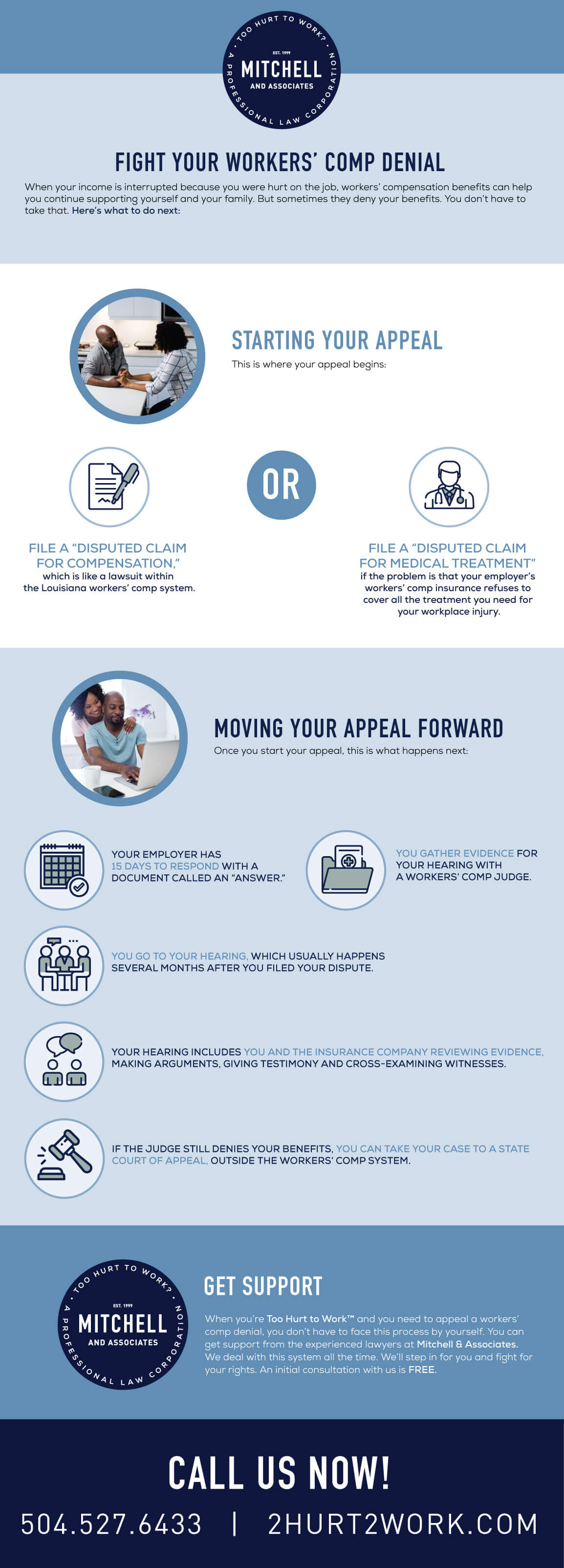What Happens When I’m Denied Workers’ Comp?

How to Fight for Your Benefits
You were hurt at work. Now you’re Too Hurt to Work™. Workers’ compensation can pay for your medical expenses and some of your lost wages—so your injury on the job doesn’t leave you financially devastated.
But can you be denied workers’ comp benefits?
Unfortunately, yes.
Paying out benefits costs money, so sometimes employers and insurance companies refuse to help you.
Don’t let them push you around. You can push back with help from an experienced worker’s comp attorney, like the New Orleans and Baton Rouge attorneys at Mitchell & Associates.
How Do Workers’ Comp Denials Happen?
You can be denied workers’ comp benefits entirely if your employer or their insurance company decides your illness or injury wasn’t related to your job. That’s when you need a lawyer to show otherwise.
But often, the problem with workers’ comp isn’t getting denied entirely—it’s getting denied the full benefits you deserve.
The insurance company refuses to pay for some of your medical treatment, for example. Or they calculate your checks for lost wages too low. Or they fail to send your payments in a timely fashion.
At Mitchell & Associates, we fight these battles all the time to make sure the workers’ comp system in Louisiana doesn’t shortchange you.
Learn More About the Benefits You Should Get.
How Do I Appeal a Denial?
When some or all of your workers’ comp benefits are denied, you can fight it by filing a “Disputed Claim for Compensation.”
This is like filing a lawsuit, except it takes place within the Louisiana workers’ comp system.
This starts the process of getting your case before a Louisiana workers’ comp judge, which can take several months.
Don’t delay. When you have a workers’ comp dispute, you have one year from the date of your work-related accident to appeal.
If your problem is getting medical treatment covered, you’ll submit a form for a “Disputed Claim for Medical Treatment.”
Once you file your dispute, your employer has 15 days to respond with a document called an “Answer.”
The next step usually is going to your hearing.
To prepare, you participate in the evidence-gathering process called “discovery.” Your employer may ask for a second medical opinion (SMO). If your doctor and the employer’s doctor don’t agree on the treatment you need, the State Medical Director might set up an independent medical evaluation (IME).
In the meantime, your employer’s lawyers will file motions with the court to dismiss your case without a hearing. Make it a fair fight by getting a lawyer of your own.
When you finally get there, your hearing day will include:
- Both sides presenting evidence
- Both sides making arguments
- Witnesses testifying
- Both sides questioning witnesses
After the hearing, if you disagree with the workers’ comp judge’s decision, you and your attorney can also appeal your case to a State Court of Appeal, outside the workers’ comp system. Typically, you have 30 days to file an appeal.
It’s scary to get denied the workers’ comp benefits you need. Times are tough when you can’t work. You wonder how to keep food on the table, a roof over your head and gas in the car.
But don’t panic.
Mitchell & Associates can step in for you—and fight for your rights.
You can get an initial assessment of your case for free.


